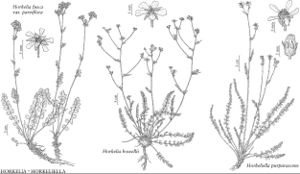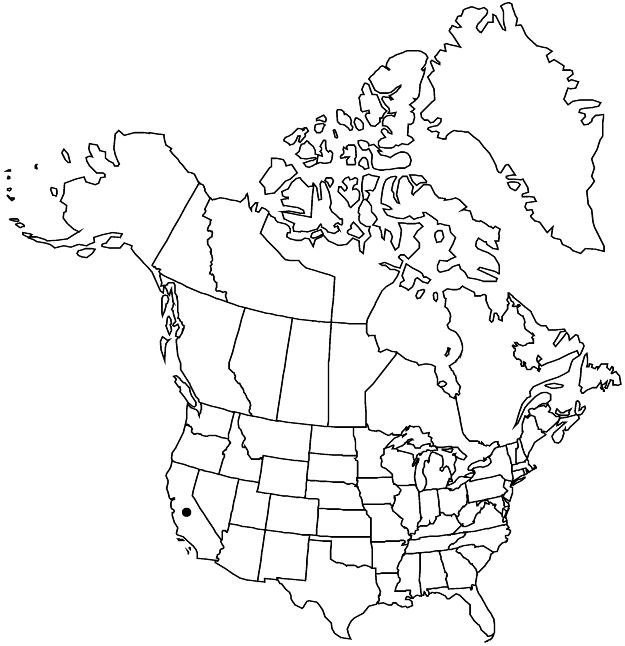Difference between revisions of "Horkeliella purpurascens"
in N. L. Britton et al., N. Amer. Fl. 22: 282. 1908.
FNA>Volume Importer |
FNA>Volume Importer |
||
| Line 22: | Line 22: | ||
|name=Ivesia purpurascens | |name=Ivesia purpurascens | ||
|authority=(S. Watson) D. D. Keck | |authority=(S. Watson) D. D. Keck | ||
| − | }}{{Treatment/ID/Synonym | + | }} {{Treatment/ID/Synonym |
|name=Potentilla purpurascens | |name=Potentilla purpurascens | ||
|authority=(S. Watson) Greene | |authority=(S. Watson) Greene | ||
| Line 40: | Line 40: | ||
|elevation=1400–2900 m | |elevation=1400–2900 m | ||
|distribution=Calif. | |distribution=Calif. | ||
| − | |discussion=<p>Typical Horkeliella purpurascens occurs on the Kern Plateau on the western slope of the southern Sierra Nevada in Kern and Tulare counties. More densely hairy populations farther south in the Piute, Scodie, and Tehachapi mountains of Kern County tend to have more congested inflorescences, shorter leaves, and fewer carpels; they may merit taxonomic recognition.</p> | + | |discussion=<p>Typical <i>Horkeliella purpurascens</i> occurs on the Kern Plateau on the western slope of the southern Sierra <i>Nevada</i> in Kern and Tulare counties. More densely hairy populations farther south in the Piute, Scodie, and Tehachapi mountains of Kern County tend to have more congested inflorescences, shorter leaves, and fewer carpels; they may merit taxonomic recognition.</p> |
|tables= | |tables= | ||
|references= | |references= | ||
| Line 64: | Line 64: | ||
|publication year=1908 | |publication year=1908 | ||
|special status=Endemic;Selected by author to be illustrated | |special status=Endemic;Selected by author to be illustrated | ||
| − | |source xml=https://jpend@bitbucket.org/aafc-mbb/fna-data-curation.git/src/ | + | |source xml=https://jpend@bitbucket.org/aafc-mbb/fna-data-curation.git/src/8f726806613d60c220dc4493de13607dd3150896/coarse_grained_fna_xml/V9/V9_434.xml |
|subfamily=Rosaceae subfam. Rosoideae | |subfamily=Rosaceae subfam. Rosoideae | ||
|tribe=Rosaceae tribe Potentilleae | |tribe=Rosaceae tribe Potentilleae | ||
Revision as of 18:16, 18 September 2019
Plants green or grayish green to gray, non-glandular hairs sparse to dense, often obscuring stipitate-glandular ones. Basal leaves (5–)7–17(–20) cm; petiole 1–5 cm; leaflets 15–30(–35) per side, (2–)3–10(–20) mm, divided into 3–6 ultimate segments, hirsute (sometimes densely so) and villous (especially marginally), infrequently viscid-stipitate-glandular, or nearly glabrous except for villous tuft at apex. Cauline leaves 2–4, 2–10 cm. Inflorescences ± open. Pedicels (1–)2–10(–15) mm. Flowers 10–15 mm diam., epicalyx bractlets linear to narrowly ovate, 1.5–3 mm; sepals 3–6 mm, hirsute, sparsely villous, sometimes minutely glandular or stipitate-glandular; petals oblanceolate to narrowly spatulate or oblong, 3–7 mm; filaments 1–2.5 mm, filament opposite center of sepal shorter than those on either side, anthers 0.5–0.8(–1) mm; styles 2.5–4 mm.
Phenology: Flowering summer.
Habitat: Dry granitic meadows at edges of conifer woodlands
Elevation: 1400–2900 m
Discussion
Typical Horkeliella purpurascens occurs on the Kern Plateau on the western slope of the southern Sierra Nevada in Kern and Tulare counties. More densely hairy populations farther south in the Piute, Scodie, and Tehachapi mountains of Kern County tend to have more congested inflorescences, shorter leaves, and fewer carpels; they may merit taxonomic recognition.
Selected References
None.

